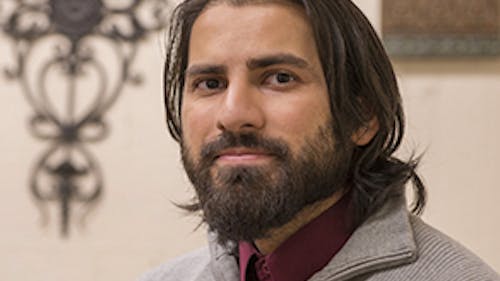Rutgers appoints its 1st full-time Muslim chaplain

Immediately after the terrorist attacks on Sept. 11, 2001, Kaiser Aslam said he was mortified about the social implications of praying in public at an airport. Now, he is worried about the legal ramifications of simply boarding a flight.
As Rutgers’ first full-time Muslim chaplain, Aslam is tasked with providing spiritual guidance to thousands of Muslim students on campus.
Although he acknowledged that it is a “scary time” for many Muslim-Americans nation-wide, Aslam said his new position requires him to distinguish between irrational and rational fears for the sake of the students he now serves.
“If there is going to be a place in which Muslim students can feel at home without being vilified, without feeling pressured to defend their Muslim identity, it would be on campus,” Aslam said.
Karen Smith, a University spokesperson, said there are an estimated 5,000 Muslim students on the three Rutgers campuses, including about 3,000 undergraduate and graduate students at Rutgers—New Brunswick.
“It’s almost like this weird paradoxical thing because it is so late in the game,” Aslam said. “But then on the flip side, we are the first ones in the country to have a full-time Muslim chaplain at a public university.”
He said his primary responsibilities include counseling students, advising student Muslim organizations, offering guidance to University faculty and staff on Muslim topics, partnering with the Rutgers and New Brunswick police departments to discuss incidents of anti-Muslim bias and acting as the University’s chief Muslim liaison with outside groups.
Aslam noted that over the last decade, the University’s Muslim community has found itself embroiled in a number situations where having an established chaplaincy would have been beneficial.
These include conflicts between the primarily Sunni and primarily Shii Muslim students organizations. a 2012 Associated Press report that found that the New York City Police Department (NYPD) had conducted anti-terrorism surveillance on various Muslim student groups at Rutgers and other college campuses in the Northeast, tensions between the Muslim Students Association and Rutgers Hillel and protests against the University’s decision to invite former Secretary of State Condoleezza Rice to serve as the commencement speaker in 2014.
Right after his arrival at Rutgers in August of 2016, Aslam said he reached out to Muslim alumni who were in school when the monitoring by the NYPD was revealed to gauge how they fared during that period without a Muslim chaplain. There was a volunteer and part-time Muslim chaplain back then, but he was based in Newark, New Jersey, and only came to New Brunswick once a month.
“All they described was that they were super confused as to what to do,” he said. “They didn’t know who to talk to. They didn’t know whether they should go to the (University) administration.”
Despite not being present for those situations, Aslam has had to deal with multiple events and issues that have alarmed the University’s Muslim community during his short tenure as chaplain.
After the presidential election last November, Aslam said many concerned Muslim students found support in the study circle he hosts every week. He called some students who were afraid to leave their residence halls to try to reassure them.
“It’s scary when you feel like you as a group are being targeted,” he said. “But, for some students, this is also a time to become closer to the community.”
When President Donald J. Trump signed an executive order barring immigration from seven predominately Muslim nations on Jan. 27, Aslam’s office — which is part of the Center for Islamic Life at Rutgers University (CILRU) — brought some immigration attorneys to offer legal advice to students planning to travel abroad.
In February, Aslam also had to respond to an incident in which a flyer by a white supremacy group that said “Imagine a Muslim-Free America,” was posted on the wall of the Paul Robeson Cultural Center, which is home to a Muslim prayer space.
Aslam said his office will tackle these issues and challenge today’s political discourse around Muslim people by making its services accessible to students, having more direct communication with the University’s administration and by cultivating a dialogue with other faith groups. He said he is already meeting with heads of Protestant, Catholic and Jewish chaplaincies at Rutgers to discuss interfaith initiatives once a month.
Hamna Qureshi, a School of Environmental and Biological Sciences senior and a member of Rutgers’ Muslim community, believes the chaplain’s arrival comes at a very opportune moment. She said the marginalization of Muslim Americans has become more salient in recent times.
“There’s been support on campus for Muslims, but having a Muslim chaplain would bring that to the next level,” she said.
Because he has had to spend a considerable amount of time on campus as he establishes the young chaplaincy he hopes one day will serve as a blueprint for future projects at other universities, Aslam has brought his 9-month-old daughter to Rutgers on various occasions to make sure he spends enough time with her.
“The students are telling me that she is not my baby, that she is now the University’s baby,” he said.
Camilo Montoya-Galvez is a School of Arts and Sciences sophomore majoring in Spanish and journalism and media studies. He is a staff writer for The Daily Targum. Follow him on Twitter @camiloreports.



